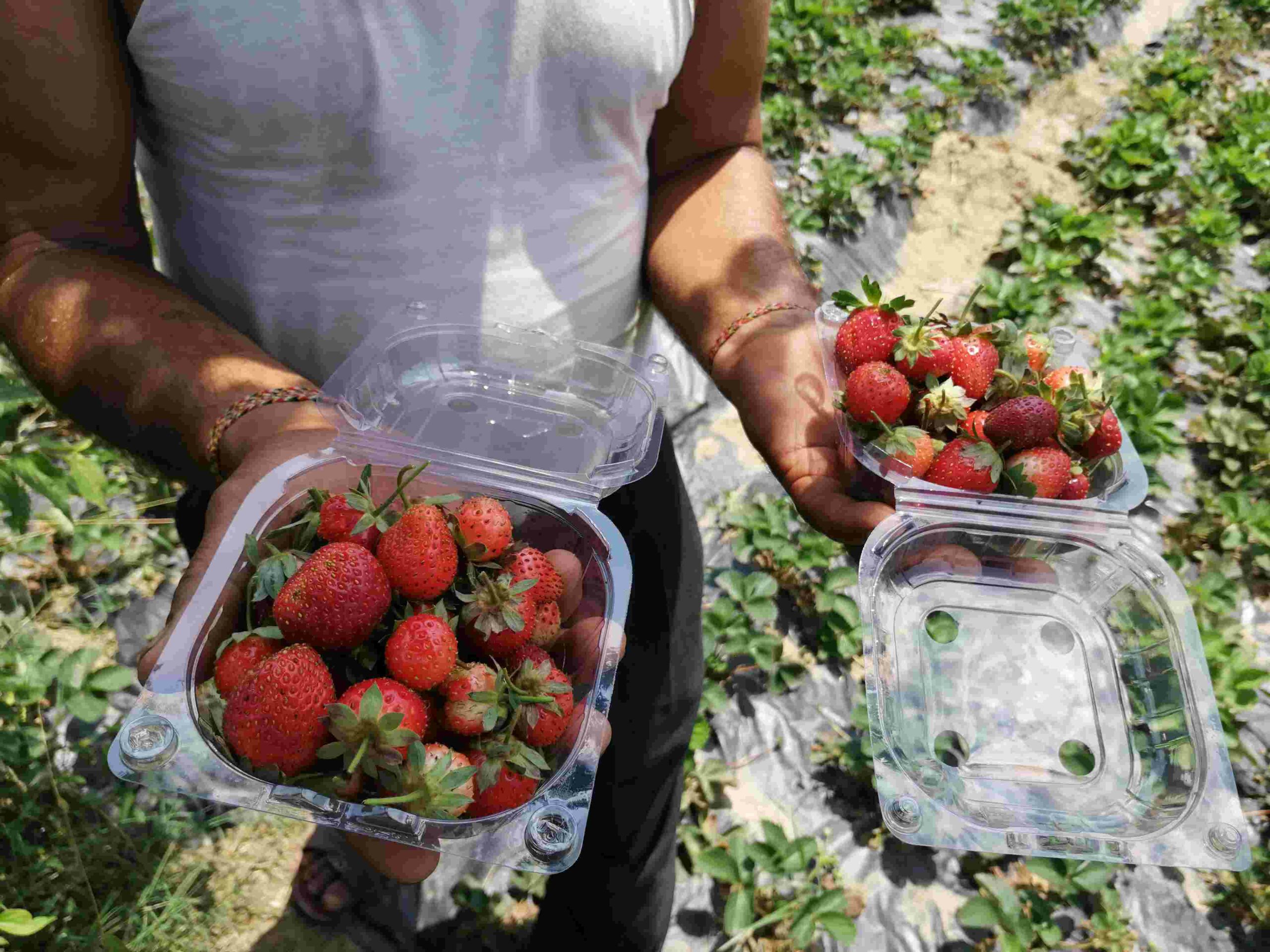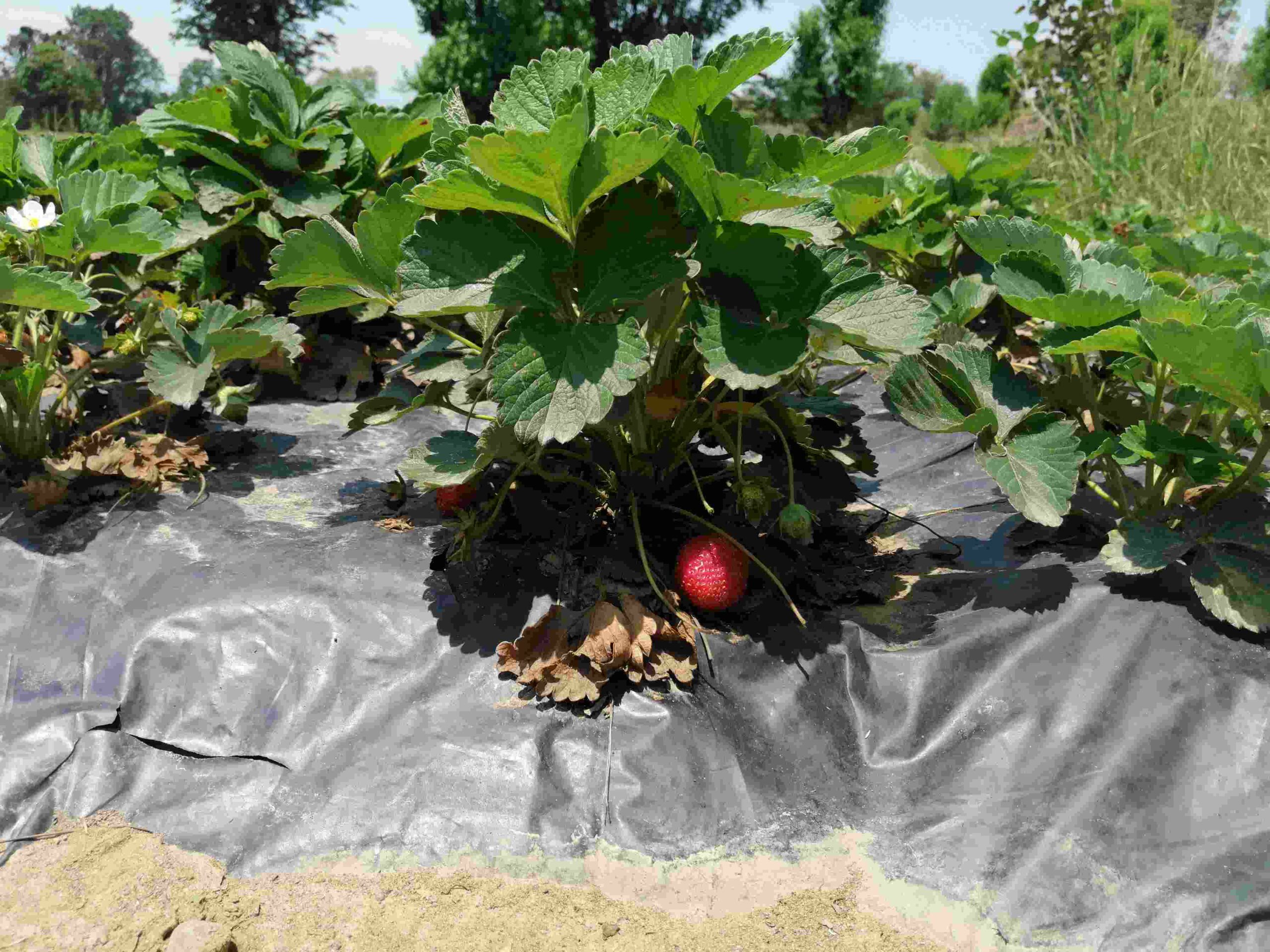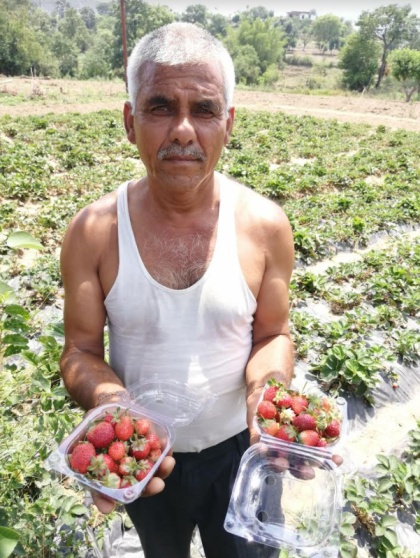In Jammu and Kashmir’s Udhampur District’s Kooh Village, which has a population of over 2,100, most farmers grow traditional wheat and maize crops as the area is by and large rainfed. Since most Kooh farmers have milch animals in their houses, they primarily use the animals’ dung as a crop booster. A few farmers also use urea in their fields.
However, until 2020, farmers of the village would hesitate to grow unconventional crops like flowers, fruits, grasses, mushrooms and oil crops, simply because no one had ever dared to do innovations with traditional agriculture.
But it was in September 2020 that Rashpal Singh, son of Tarlok Singh of Kooh Panchayat, who owns several Kanals (1Kanal=5,445 square feet) of plain agricultural land, was told about the scope of growing organic strawberries by one Vikas Sharma of his village, who works as a technician with Jammu and Kashmir Horticulture Department.

The department provides Rs 13,000 subsidy per Kanal of agricultural land to the farmers to grow fruit crops. Accordingly, Rashpal completed his file in all respects and applied for a subsidy.
In November 2020, Singh’s project got a sanction from the Jammu and Kashmir Government and in December last year, the Horticulture Department officials helped him plant around 22,500 strawberry runners over his 10 Marlas of agricultural land (10 Marlas=half kanal). As per the departmental standards, some 45,000 runners are sown over one Kanal.
“Since the crop was new to our fields, I too had doubts about it giving proper dividends. But then I took the risk because growing wheat crop on 10 Marlas of land until 2020 was paying me only Rs 1,000,” Rashpal says, adding, “Losing Rs 1,000 crop was not a big deal.”
Rashpal spent just Rs 7,000 for purchasing the mulch to cover up his strawberry crop so that it is protected from unwanted weeds, pests and insects. Mulch also helps in water retention. Around Rs 1,000 would have been spent on purchasing the pesticides and spray pumps. Another Rs 2,000 were spent on the purchase of punnets later at the time of the crop sale.
Vikas elaborates that at the time of sowing of runners, farmyard manure is applied to the saplings. Later, vermicompost is applied to the plants through the holes made up in the mulch. “Mulch has not reduced the need for pesticides. It only protects the plants from unwanted weed and fruits from getting buried in the soil,” he says.

In March, Rashpal says, his strawberry runners started bearing flowers and fruits. “Initially, we sold our produce in Udhampur’s fruit and vegetable mandis. But there we were getting only Rs 15-20 per raw packet of the ripe strawberries, from the ‘Aadtis’ (middlemen). In April 2021, I stopped selling the fruit in the mandis.”
Thereafter, Rashpal and his son started selling their fruit produce in attractive punnets they had purchased from private dealers at a rate of Rs 35-40 directly to the travelers and tourists.
They set up shop by the sides of Jammu-Srinagar National Highway and other link roads connecting District Headquarters.
The Horticulture, Planning and Marketing Department helped around five strawberry farmers of Udhampur town in purchasing the punnets from private dealers. Vijay Attri, the Horticulture and Marketing Inspector of the Udhampur-based Sabzi Mandi says: “We had been watching the strawberry farmers of Udhampur getting disappointed with the rates they were getting from the sabzi mandi’s ‘Aadtis’. After we provided them with punnets, they sold their produce at the rate of Rs 25-30 in the sabzi mandis itself and for Rs 35-40 in other locations.”
“Our department is mulling over providing them with some plastic trays in the next season of their crop. In these trays, around 10 packets can be stored and sold in bulk. This arrangement will also help them get good rates,” says Attri.
Within the span of three months, between March and May, Rashpal says he earned around Rs 40,000 from the crop grown over just 10 Marlas of land.
“I made around Rs 30,000 profit from a single three-month crop,” the elated Rashpal says.

Happy with the success of his previous crop, the farmer of Kooh Panchayat is planning to grow organic strawberries over his around 2 Kanals of agricultural land by December 2021. He says, “Gradually, the net sown area would be increased in the coming years.”
“My son works as a labourer in Ladakh where he is paid around Rs 20,000 salary per month. If I grow a strawberry crop over 2 Kanals of land this year, I won’t have to send him to Ladakh, which is some 650 km far away from Udhampur,” the 52-year-old farmer says.
The progressive farmer says so far, his strawberry runners are “unharmed and intact”. He says, “If they remain safe up to November this year, I won’t buy new runners from the market for my next crop and this would be a major saving in itself.”
(Written by Bivek Mathur; Edited by Yoshita Rao)
No comments:
Post a Comment